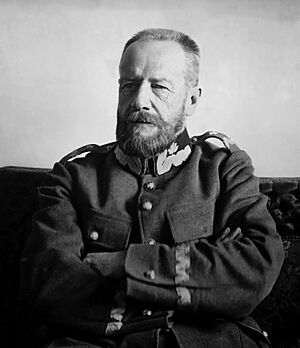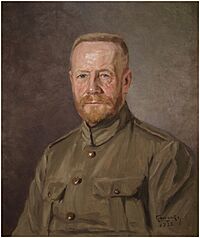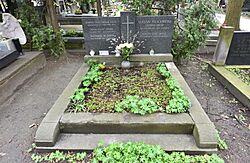Lucjan Żeligowski facts for kids
Quick facts for kids
General
Lucjan Żeligowski |
|
|---|---|
 |
|
| Leader of the Republic of Central Lithuania | |
| In office 12 October 1920 – 24 March 1922 |
|
| Preceded by | office established |
| Succeeded by | office abolished |
| Personal details | |
| Born | 17 October 1865 Oshmyansky Uyezd, Russian Empire (now Belarus) |
| Died | 9 July 1947 (aged 81) London, England |
| Nationality | Polish |
| Awards | |
| Military service | |
| Allegiance | |
| Branch/service | Imperial Russian Army (1885–1915, 1917) Polish Armed Forces in the East (1915–1917, 1917–1919) Polish Armed Forces (1919–1920, 1922–1927, 1939) Army of Central Lithuania (1920–1922) Polish Armed Forces in the West (1940) |
| Years of service | 1885–1926 1939–1940 |
| Rank | General of the branch |
| Commands | Front Commander Head of State of Central Lithuania Minister of Military Affairs |
| Battles/wars | Russo-Japanese War World War I
Polish–Ukrainian War
Central Lithuanian Offensive on Kaunas |
Lucjan Żeligowski (born October 17, 1865 – died July 9, 1947) was a Polish general and politician. He was a military leader who fought in World War I, the Polish-Soviet War, and World War II. He is best known for his role in an event called Żeligowski's Mutiny. He also led a short-lived country known as the Republic of Central Lithuania.
Contents
Early Life and Military Career
Lucjan Żeligowski was born on October 17, 1865. His birthplace was a small farm area called Przechody, near the village of Sikūnė. This area was part of the Russian Empire, in what is now Belarus. His parents, Gustaw and Władysława Żeligowska, were Polish.
Żeligowski grew up in a poor family. He spoke a local language called tutejszy, which was a dialect of Belarusian. He saw himself as a "Litvin," which meant he felt connected to the historical lands of Lithuania. He also had positive views about Belarusian people.
After finishing military school in Riga in 1885, Żeligowski joined the Imperial Russian Army. He served in different leadership roles. He later married Tatiana Pietrova and had two children.
Fighting in Early Wars
Żeligowski fought in the Russo-Japanese War from 1904 to 1905. This was a conflict between Russia and Japan.
During World War I, he was a lieutenant colonel. He commanded a Russian rifle regiment. This was a very important role during the war.
Serving in the Polish Army
After the February Revolution in 1917, Żeligowski helped create the Polish Army within the former Russian Empire. He started as a commander of an infantry regiment. Soon, he was promoted and led a larger group of soldiers.
In 1918, he began forming a Polish unit in the Kuban region. This unit later became the 4th Polish Rifle Division. His division fought alongside the White movement in the Russian Civil War. By October 1918, he was in charge of all Polish units fighting in Russia.
Return to Poland and New Conflicts
When the Polish-Bolshevik War started, Żeligowski's unit had to retreat to Romania. They helped defend the border against attacks from the Bolsheviks. In April 1919, his division moved to the newly formed Second Polish Republic. There, it became the Polish 10th Infantry Division.
During the war against Russia, Żeligowski became a general. He was a close friend of Polish Marshal Józef Piłsudski. Żeligowski was given command of a special group of soldiers named after him. This group included his 10th division and other units. He soon led the entire "Lithuanian-Belarusian Front." This front operated in the areas of Polesie and the Pinsk Marshes.
During the Battle of Warsaw (1920) in 1920, his unit helped the 3rd Polish Army. They chased the fleeing Bolshevik forces at the Battle of the Niemen River. Żeligowski felt that losing Lithuania would greatly weaken Poland. He believed that many soldiers, even those from Lithuania, understood this.
Republic of Central Lithuania
In October 1920, Żeligowski was chosen to lead the 1st Lithuanian-Belarusian Infantry Division. This group was made up of volunteers and fighters from modern Belarus and Lithuania. On October 8, 1920, Żeligowski carried out a "staged mutiny." This meant it looked like he was rebelling, but it was planned. He took control of the city of Vilnius and the surrounding area. This event is known as Żeligowski's Mutiny.
On October 12, he declared the area an independent country. He called it the Republic of Central Lithuania, with Vilnius as its capital. At first, he was the military leader. But after elections, he gave power to a new parliament. This parliament then decided that the area should join Poland.
Żeligowski believed that Lithuania was very important for Slavic people. He felt it could help different groups like Poles, Russians, and Ukrainians get along. He thought the people of Lithuania were naturally good at bringing everyone together.
He also explained his actions in October 1920. He said that he, a "Lithuanian Żeligowski," occupied Vilnius with an army of Lithuanians and Belarusians. He mentioned his family's long history in the region, serving in defense. He dreamed of living with his countrymen in the Vilnius region. He saw Poles, Belarusians, and Samogitians as one people. He felt that being Lithuanian and Polish were connected and made him who he was.
Later, in his memoirs published in 1943, Żeligowski criticized Poland for taking over the Republic of Central Lithuania. He also disagreed with policies that closed Belarusian schools. He felt that Poland did not follow Marshal Piłsudski's plans for a confederation (a loose union of states).
Later Life and World War II
After Central Lithuania joined Poland, Żeligowski continued to serve in the Polish Army. In 1923, he was promoted to a three-star general. He became an "army inspector," which meant he commanded the military district of Warsaw. In 1925, he also served as the Polish Minister of Military Affairs.
He retired in 1926 and moved to his family home near Vilnius. In 1930, he published a book about his experiences in the Polish-Bolshevik War. He also wrote many articles for Polish newspapers. In 1935, he was elected as a member of parliament. He served in the Sejm (Polish parliament) until World War II began in 1939.
World War II and Passing Away
When World War II started with the Invasion of Poland (1939), Żeligowski wanted to join the Polish Armed Forces. However, he was 74 years old and in poor health, so he was not accepted. Still, he advised the command of the Polish southern front.
After Poland was defeated, he avoided capture by German and Soviet forces. He managed to reach France, where he joined the Polish Government in Exile. This government was led by General Władysław Sikorski. Żeligowski was an active member of the Polish National Council, which was an advisory group. After France was defeated in 1940, he moved to London.
After World War II ended, Żeligowski planned to return to Poland. However, he passed away suddenly on July 9, 1947, in London. His body was brought back to Poland. Lucjan Żeligowski was buried in the Powązki Military Cemetery in Warsaw.
Honours and Awards
Lucjan Żeligowski received many awards for his military service and contributions:
- Commander's Cross of the Virtuti Militari (and the Silver Cross)
- Grand Cross of the Polonia Restituta
- Cross of Independence with Swords
- Cross of Valour (four times)
- Cross of Merit of the Army of Central Lithuania
- Commemorative Medal of the War of 1918-1921
- Medal "Decade of the Restoration of Independence" (Poland)
- Order of St. George IV class (Russian Empire)
- Order of St. Vladimir with Swords class IV (Russian Empire)
- Order of St. Anna, class II and III (Russian Empire)
- Order of St. Stanislaus, II class (Russian Empire)
- Commander's Cross of the Legion of Honour (France)
- Croix de Guerre (France)
- Golden Laurel of the Polish Academy of Literature
- Honorary citizen of Warsaw
Published Works
Żeligowski also wrote several books and articles:
- War of 1920: Memories and thoughts (Wojna w roku 1920. Wspomnienia i rozważania)
- On the Slavic Idea (O ideę słowiańską.)
- Forgotten Truths (Zapomniane prawdy.)
See also
- Central Lithuania
 | Bessie Coleman |
 | Spann Watson |
 | Jill E. Brown |
 | Sherman W. White |




